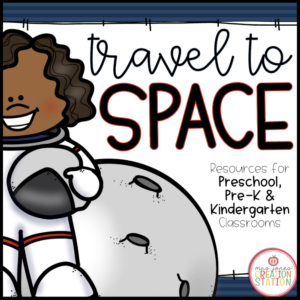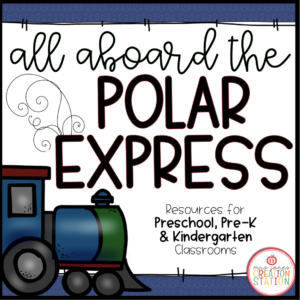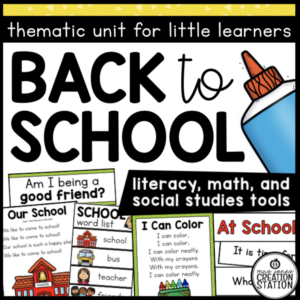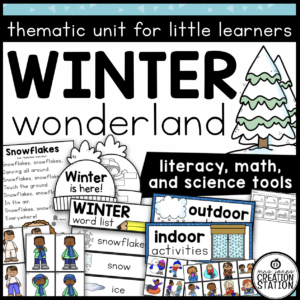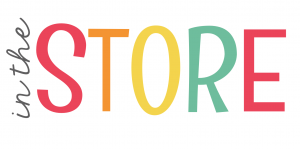Menu
Buy the BUNDLE and SAVE! You can purchase this resources in the Thematic Activities for Little Learners Bundle and the Little Learners Mega-Bundle!
____________________________________________________________________
Week 33 Plans
This is a template for lesson plans during a camping unit. Pick and choose what ideas and resources work for your learners.
Camping – Whole Group
These resources can be used during whole group instruction for a camping theme. They include a poem, word cards, tracing page and table sign in sheets.
Camping Interactive Poem
Use this poem during a thematic lesson, whole group or a literacy center and have learners plan items to take on a camping trip.
Camping Thematic Plans
Use these plans as a guide for engaging camping read alouds and activities in the classroom.
Camping Adventures
Read When We Go Camping and have learners list activities they can do while camping using the images provided or their own.
Camping List
Reread When We Go Camping and have learners plan items they need for camping in the woods and items they want for fun.
In the Woods
Read In the Woods and have learners sort animals that live in the woods and animals that live in other habitats.
Forest Tracks
Read Over in the Forest and create an Animal Tracking chart together. Learners may then search for animals tracks around the ‘campground’.
Camping Nights
Read Flashlight and have learners go on a nighttime scavenger hunt with flashlights to find the items in the room.
Camping Brochure
Have learners complete the brochure throughout the unit.
Camping Sensory Charts
Explore camping with the five senses. Complete the charts together and have learners draw and write about their experience camping using their senses on the interactive page.
Camping Predictable Chart Class Book
Use this resource to create a class book from the predictable chart created during the week.
Literacy Center | Build a Word
Have learners build the sight words on a pocket chart.
Literacy Center | Changing Sounds
Have learners writing the missing sound in each word to see how the word changes.
Literacy Center | Final Sound
Have learners find the missing final sound in each word.
Math Center | Graphing Data
Have learners sort and record the pictures on the chart. Two graphs are provided.
Math Center | Missing Number
Have learners find the missing number in each set.
Math Center | Subtraction
Have learners use the page provided to solve subtraction equations with the help of the subtraction mat.
WEBSITE | FACEBOOK | INSTAGRAM | PINTEREST | TEACHERS PAY TEACHERS
© Mrs. Jones’ Creation Station, Inc
How can I see what is new in the MJCS store?
Be the first to know about new discounts, freebies, and new products. You can also subscribe to our newsletter to receive access to resources only available to MJCS subscribers, as well as, special offers and ideas!
How can I get credit for my TpT purchases?
Go to your account button at the top of the page. Under the “Buy” section, click “My Purchases “. Beside each purchase you’ll see a Provide Feedback button. Simply click the button and you will be taken to a page where you can give a quick rating and leave a comment for the product. Each time you give feedback, TpT gives you feedback credits that you use to lower the cost of your future purchases. Please leave detailed feedback for each resource, so we are able to create better resources for teachers and students.
How can I find a certain activity in a large PDF file?
If the resource you purchase has a variety of activities compiled into one PDF find the table of contents and click on the activity title. This should take you to that specific activity in the resource.
What can I do if I have a question about a resource?
If you have any questions regarded a resource before purchasing please email me at mrsjonescreationstation[at]gmail.com. Once you have purchased the resource you may use the “Product Q and A” tab on the product page to ask a question, as well.
How do I know if a resource has been updated?
Go to your account button at the top of the page. Under the “Buy” section, click “My Purchases “. Choose to “sort by: recently updated” to see what resources have been updated since you downloaded them last. You can download any updates from there. If a file has been updated, you will see a notification under the resource that says “Newly Updated – Download for Free!”
This item is a paid product created by Mrs. Jones’ Creation Station, Inc. Copying any part of this product, redistributing, selling or placing it on the internet in any form is strictly forbidden and is a violation of the Digital Millennium Copyright Act (DMCA). Thank you for respecting our work!
YES, YOU CAN…
NO, YOU CAN’T…
Click here for a detailed post with step-by-step directions.
You will need to download fonts specified in the resource and install it on your computer before downloading the editable file.
Install the most recent version of Adobe Reader onto your computer. If you have any problems editing, viewing or printing a file make sure your Adobe Reader is updated.
Now you can download the file to your computer. Once the file has downloaded open in Adobe Reader. You should be able to view the editable fields and the text should match the product description. If you have any problems editing the file, make sure you have followed the directions above and then contact me at mrsjonescreationstation[at]gmail.com
